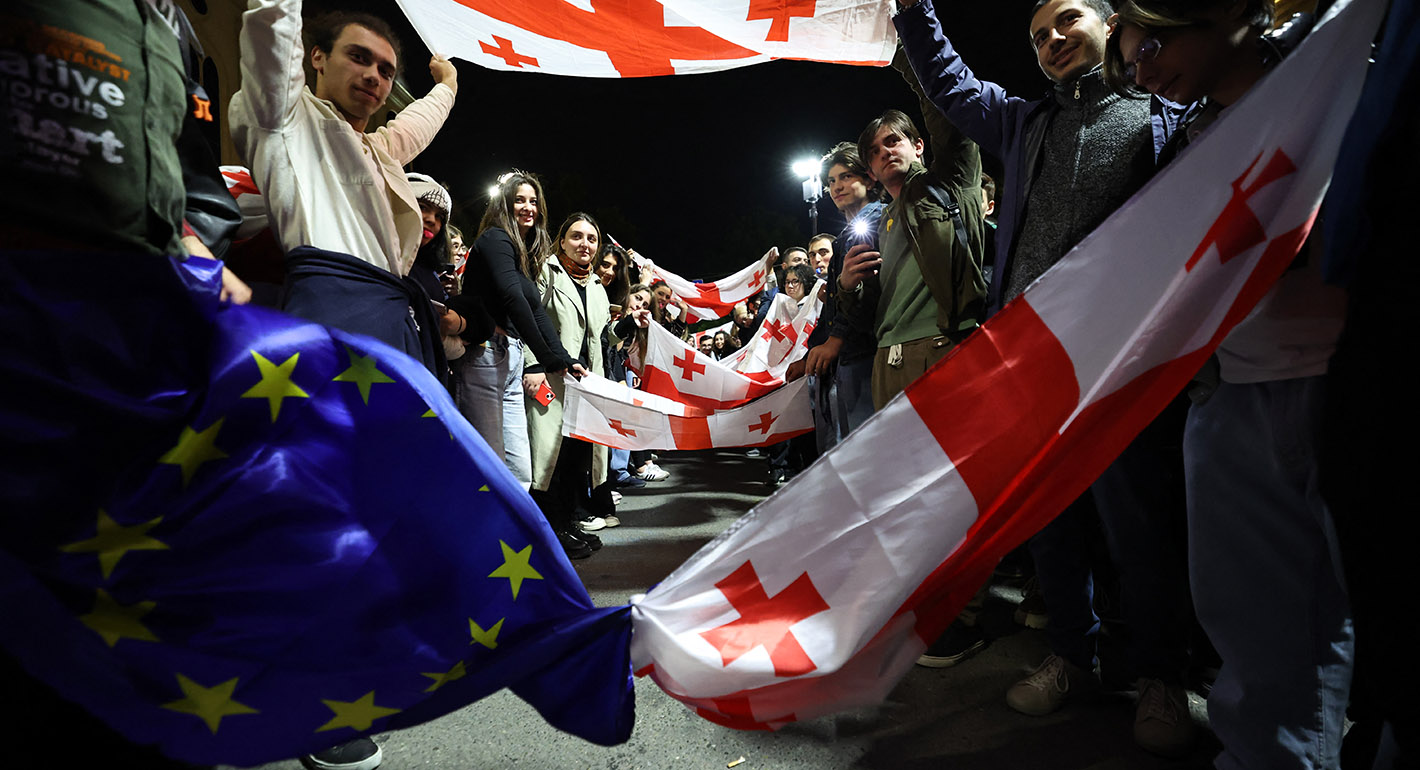The story of a has-been politician apparently caught red-handed is intersecting with the larger forces at work in the Ukrainian parliament.
Konstantin Skorkin
{
"authors": [
"Emil Avdaliani"
],
"type": "commentary",
"blog": "Carnegie Politika",
"centerAffiliationAll": "",
"centers": [
"Carnegie Endowment for International Peace",
"Carnegie Russia Eurasia Center"
],
"englishNewsletterAll": "",
"nonEnglishNewsletterAll": "",
"primaryCenter": "Carnegie Russia Eurasia Center",
"programAffiliation": "",
"programs": [],
"projects": [],
"regions": [
"Georgia",
"Caucasus"
],
"topics": [
"Democracy",
"Civil Society"
]
}
Source: Giorgi Arjevanidze / AFP via Getty Images
Passage of the controversial bill may drive a wedge between Tbilisi and Brussels and pave the way for a rapprochement with Russia.
The Georgian parliament has passed in its third and final reading a deeply divisive new law that will tightly regulate NGOs and designate those receiving foreign funding as “foreign agents.” The law, which resembles a Russian law that has been used to decimate civil society, was originally introduced in 2023 by the country’s ruling party, Georgian Dream, but was subsequently withdrawn following street protests in Tbilisi. Back then, Georgian Dream promised it would never be put to a vote again.
In April, however, the party reintroduced the highly controversial bill to parliament. It is unchanged from the 2023 version apart from the descriptor (“organization carrying out the interests of a foreign power”), from which the contentious term “agent” has been dropped. The bill requires NGOs that get more than 20 percent of their funding from abroad to submit annual reports to avoid financial penalties.
First and foremost, the legislation was reintroduced in a bid to solidify the ruling party’s position ahead of critical parliamentary elections in October. NGOs are often seen by Georgian Dream as allies of the political opposition—primarily, the United National Movement. It’s true that NGOs have been a thorn in the side of the current government, helping to produce investigations into allegedly unfair tenders, corruption, and nepotism. But Georgian Dream has also charged NGOs with fomenting unrest, and accused the United States and the European Union (the two primary donors for Georgian NGOs) of interfering in domestic affairs—in particular, weakening the ruling party and the Georgian Orthodox Church.
The logic is clear: Georgian Dream fears that pressure from the United States and the EU (where there is increasing disenchantment with the political situation in Georgia), coupled with the growing unhappiness in Georgia, could stop it from winning enough votes for a parliamentary majority in the elections.
Georgian society is deeply divided over the law. Some see it as an anti-Western project that will endanger the country’s chances of beginning EU accession talks. They believe the process has been coordinated with Moscow (and point to Georgian Dream founder Bidzina Ivanishvili’s close links with Russia).
Even more serious is the belief that the proposed legislation is just the beginning, and that once on the statute books, it will be strengthened to target anyone who criticizes Georgian Dream. Opponents fear a “Russian scenario” in which “foreign agents” are banned from participating in elections, and where constant harassment leads to the closure of most NGOs.
Supporters of the ruling party, however, argue that the law will bring transparency to the NGO sector and limit Western influence. They also frame the bill as a way to protect Georgian religion and national identity from LGBTQ “propaganda” and liberal values. These messages are hammered home in statements from Georgian Dream politicians (including, notably, at a pro-government rally on April 29 in central Tbilisi). More importantly, the bill is regarded as an effective way to put pressure on the political opposition.
There are no meaningful constitutional obstacles to prevent the bill from becoming law. President Salome Zourabichvili has said she will veto the bill, but Georgian Dream will be able to bypass this because of its majority.
Since the reintroduction of the bill, Georgian Dream’s popularity has suffered. This is evident on social media, television, and above all in the public protests roiling the country. On several occasions, anti-bill rallies have been attended by over 100,000 people—an unprecedented number for a country where the opposition is fragmented and political apathy runs deep. The current protest movement is even broader than in 2023, when it forced the government to shelve the law. All major cities in Georgia have now seen demonstrations. Young people are particularly active, and growing politicization means turnout in October is likely to be high. This will not work in Georgian Dream’s favor.
The bill will also have profound geopolitical consequences. Above all it is likely to limit Georgia’s chances of progressing on its path toward membership of the EU. After Georgia achieved EU candidate status in December 2023, accession talks were planned for late 2024. Now, however, Georgia could be left out in the cold. Amid the debate over the bill, members of the European Parliament have said Georgian officials could be sanctioned. Similarly, EU plans to gradually drop visa requirementsfor Georgian nationals now hang in the balance.
There is also much at stake for Brussels. The EU values Georgia’s role as a gateway to the so-called Middle Corridor, a trade route that leads to Central Asia and China, circumventing Russia from the south. Georgia’s role as a land link to Armenia is also critical, particularly as Yerevan seeks to forge stronger connections with Europe amid tensions with Moscow.
If Georgia damages its ties to the EU, Moscow will take note. Russia and Georgia have not had formal diplomatic relations since the Russian invasion of 2008, but the two countries have maintained stable ties amid the war in Ukraine. Georgia has abstained from overt anti-Russian rhetoric; bilateral trade volumes have increased; direct flights were restarted after a multi-year hiatus; and Moscow abolished visa requirements for Georgians. Most significantly, Russia approves of Tbilisi’s increasingly anti-Western stance, with Russian officials praising the efforts to push through the NGO law.
Moscow obviously expects the contentious new law to drive a wedge between Tbilisi and Brussels, and the West in general. Such a wedge could create fertile ground for Russia and Georgia to seek to improve their troubled relations. Russia’s military influence in the separatist Georgian regions of Abkhazia and South Ossetia could be leveraged to achieve concessions, including a less tense security situation along the demarcation line, or reestablishment of economic links with the rest of Georgia. Indeed, there is even a fear in South Ossetia, and to a certain extent in Abkhazia, that the breakaway regions could be used as bargaining chips in a tentative Russia-Georgia rapprochement.
There is also a broader geopolitical context. Russia’s foreign policy in the South Caucasus is in flux. Moscow’s relations with Yerevan are at an all-time low, while Azerbaijan feels ever more confident. This creates momentum for Moscow to reorient its focus toward Georgia and Azerbaijan—and the successful passage of the law on NGOs will only fuel this process.
For Georgian officials, the law and general tensions with the West are fully in line with what Tbilisi has been pursuing since the war in Ukraine began: a multi-vector foreign policy. It’s unlikely that Tbilisi will simply turn away from the West to Russia, and the West is unlikely to walk away. But the law on NGOs highlights the limits of Western influence in a region where a multiplicity of geopolitical actors creates opportunities for smaller countries—like Georgia—to chart their own course, however risky that might be.
Carnegie does not take institutional positions on public policy issues; the views represented herein are those of the author(s) and do not necessarily reflect the views of Carnegie, its staff, or its trustees.
The story of a has-been politician apparently caught red-handed is intersecting with the larger forces at work in the Ukrainian parliament.

Konstantin Skorkin
It’s one thing to export Russian helicopters to Iran to fight the insurgency, and it’s easy to imagine Moscow becoming a haven for fleeing Iranian leaders. But it’s very difficult to imagine Russian troops defending the Iranian regime on the ground.

Nikita Smagin
While appointing Kyrylo Budanov will help shore up Zelensky’s political authority and balance the president’s inner circle, the spy chief’s political ambitions mean he could be a threat.

Konstantin Skorkin
While signaling internationally that it wants peace, the Azerbaijani regime continues to promote anti-Armenian sentiment at home to mobilize domestic support.

Bashir Kitachaev
Putin used his annual Q&A to make it perfectly clear: he will not agree to an end to the war until he at least gets control of the entire Donbas.

Vladislav Gorin